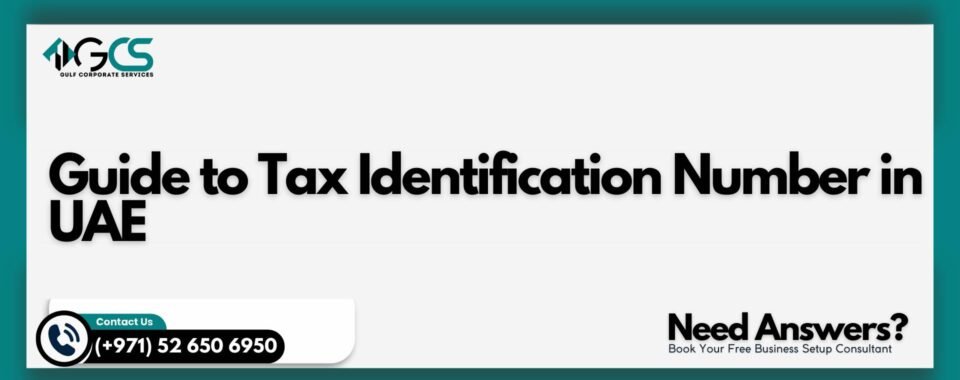
The Tax Identification Number in UAE is a unique number assigned to businesses and individuals by the Federal Tax Authority (FTA) for tax-related purposes. With the UAE’s evolving tax regulations, understanding how to obtain and use this number is crucial for compliance. Whether you are a business owner, an entrepreneur, or an individual with taxable income, having a Tax Identification Number in UAE ensures smooth financial operations and adherence to the country’s taxation system.
This guide will provide a comprehensive overview of Tax Identification Number in UAE, its importance, eligibility criteria, application process, and how businesses can benefit from it.
What is a Tax Identification Number in UAE?
The Tax Identification Number in UAE (TIN) is a distinctive numeric code issued to registered businesses and individuals for tax-related purposes. It is also known as the Tax Registration Number (TRN) in the UAE. This number is essential for businesses operating under the Value Added Tax (VAT) system and other tax regulations imposed by the UAE government.
The TIN in UAE helps businesses and individuals comply with VAT requirements, ensuring smooth transactions and accurate tax reporting. The number is used in invoices, tax returns, and official tax communications with the Federal Tax Authority.
Why is a Tax Identification Number Important in UAE?
Having a Tax Identification Number in UAE is essential for businesses and individuals involved in taxable activities. The UAE introduced VAT in 2018, making it mandatory for businesses exceeding a specific revenue threshold to register for VAT and obtain a TIN.
Key Reasons Why a Tax Identification Number is Important:
- Legal Compliance – Businesses must obtain a Tax Identification Number in UAE to comply with VAT regulations.
- Tax Payments and Refunds – Companies use their TIN for VAT payments and claiming refunds from the FTA.
- Official Business Transactions – The TIN is required when issuing invoices and conducting business within the UAE.
- Avoiding Penalties – Failure to obtain a TIN can result in legal fines and penalties from the Federal Tax Authority.
- International Transactions – Businesses dealing with international clients and suppliers may need a TIN for cross-border transactions.
- Transparency and Credibility – A TIN in UAE enhances a company’s credibility in the business community.
Who Needs a Tax Identification Number in UAE?
The Tax Identification Number in UAE is required for businesses and individuals engaging in taxable activities. The eligibility to apply for a TIN depends on several factors, including revenue thresholds and business operations.
Entities and Individuals Who Need a TIN in UAE:
- Businesses with VAT-Eligible Revenue
- Any business generating annual revenue exceeding AED 375,000 must register for VAT and obtain a Tax Identification Number in UAE.
- Voluntary VAT Registration
- Businesses with revenue between AED 187,500 and AED 375,000 can voluntarily apply for VAT registration and receive a TIN in UAE.
- Freelancers and Self-Employed Professionals
- Certain self-employed individuals earning taxable income may be required to register for VAT and obtain a TIN.
- Companies Engaged in International Trade
- Businesses involved in import/export activities often need a Tax Identification Number in UAE for tax reporting and compliance.
- Corporate Entities and Large Businesses
- Corporations operating within the UAE must obtain a TIN to comply with tax laws and maintain transparent financial records.
Steps to Apply for a Tax Identification Number in UAE
The process to obtain a Tax Identification Number in UAE is straightforward, provided the applicant meets all requirements set by the Federal Tax Authority.
Step 1: Prepare Required Documents
Before starting the application process, businesses and individuals must gather the necessary documents. These include:
- Valid trade license (for businesses)
- Emirates ID (for UAE residents)
- Passport copy (for foreign investors)
- Financial records or business revenue statements
- Company incorporation documents
- Bank account details
- Memorandum of Association (MoA) (if applicable)
Step 2: Create an FTA Account
Applicants must register on the Federal Tax Authority (FTA) portal and create an account.
Step 3: Fill Out the Online VAT Registration Form
- Log in to the FTA portal and navigate to the VAT registration section.
- Provide company details, including trade license information, business activities, and financial turnover.
- Submit the required documents in the specified format.
Step 4: Submit the Application
After completing the VAT registration form, applicants must review and submit their application. The FTA will verify the information before assigning a Tax Identification Number in UAE.
Step 5: Receive Tax Identification Number (TIN)
Once approved, businesses will receive their TIN in UAE, which must be used for all tax-related transactions and invoicing.
How to Verify a Tax Identification Number in UAE?
Businesses and individuals can verify a Tax Identification Number in UAE using the Federal Tax Authority’s official verification tool. This ensures that the TIN used in transactions is valid and registered with the UAE government.
Steps to Verify a TIN in UAE:
- Visit the Federal Tax Authority (FTA) website.
- Go to the TRN Verification Tool section.
- Enter the Tax Identification Number and submit the request.
- The system will confirm whether the TIN is valid or invalid.
Verifying a TIN in UAE before conducting transactions helps prevent fraud and ensures compliance with VAT regulations.
Common Mistakes to Avoid When Applying for a TIN in UAE
Many businesses face issues during the Tax Identification Number in UAE application process due to common errors. To ensure smooth registration, applicants should avoid the following mistakes:
- Providing Incorrect Information – Any mismatch in business details can result in application rejection.
- Not Meeting VAT Threshold Requirements – Businesses below the required revenue limit should not apply for mandatory VAT registration.
- Failure to Submit Supporting Documents – Incomplete documentation leads to delays in processing the TIN in UAE.
- Ignoring Renewal and Compliance Requirements – Businesses must maintain accurate tax records and renew their VAT registration as needed.
- Late Registration – Businesses that delay VAT registration may face penalties from the FTA.
Benefits of Having a Tax Identification Number in UAE
Acquiring a Tax Identification Number in UAE offers various advantages to businesses and professionals. Some of the primary benefits include:
Compliance with UAE Tax Regulations
- Having a TIN in UAE ensures that businesses comply with VAT regulations, avoiding penalties and legal issues.
Business Credibility and Growth
- A registered Tax Identification Number enhances the reputation of a company, making it easier to build trust with clients and partners.
Ease of International Transactions
- Businesses involved in cross-border trade require a TIN in UAE to conduct smooth financial transactions.
VAT Refund Eligibility
- Registered businesses can claim VAT refunds on eligible expenses, improving financial efficiency.
Streamlined Tax Reporting
- A Tax Identification Number in UAE simplifies tax filing and reporting, ensuring accurate financial management.
Conclusion
The Tax Identification Number in UAE is a fundamental requirement for businesses and individuals engaging in taxable activities. It ensures compliance with UAE tax laws, facilitates financial transactions, and enhances business credibility. By understanding the application process, verifying TINs, and avoiding common mistakes, businesses can ensure smooth tax operations in the UAE.
For those seeking expert assistance in obtaining a Tax Identification Number in UAE, a Business Setup Company in Dubai can provide professional guidance and support, ensuring full compliance with regulatory requirements.








